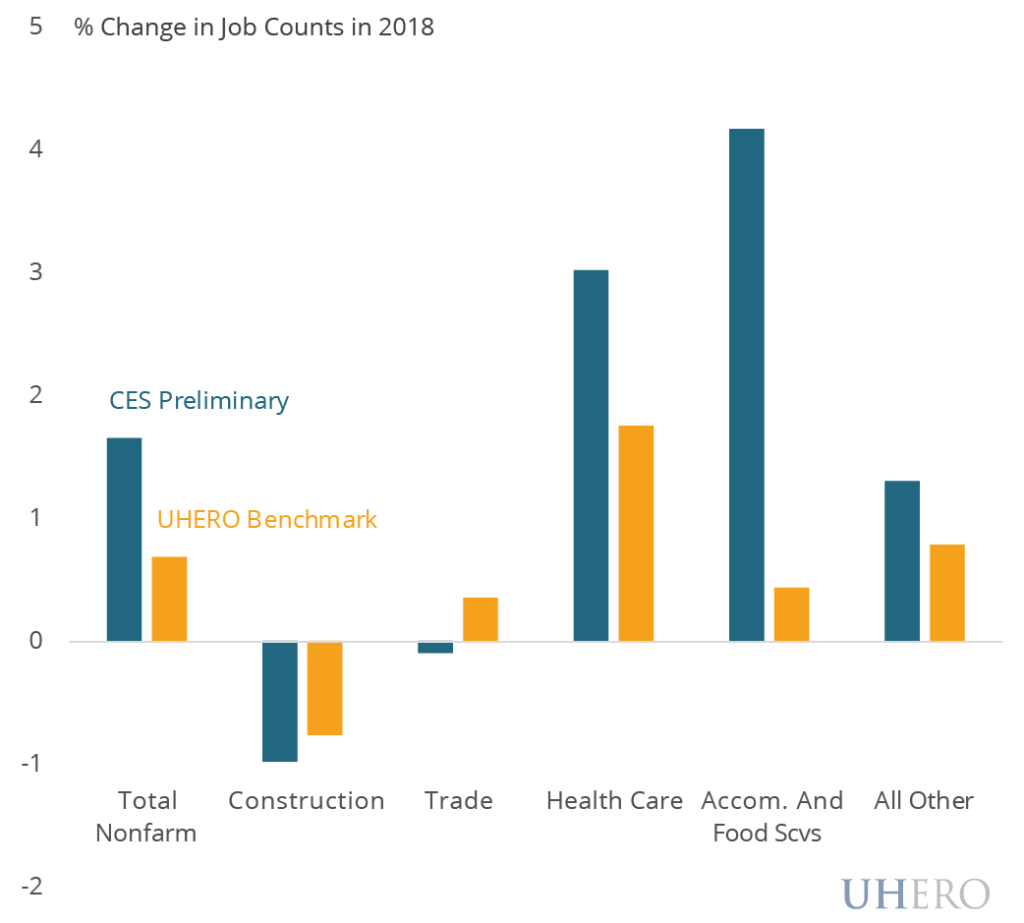By Peter Fuleky, James Jones, Ashley Hirashima, and Rachel Inafuku
The most widely cited measure of labor market activity in Hawaii comes from the Current Employment Statistics (CES) program, jointly managed by the US Bureau of Labor Statistics (BLS) and Hawaii Department of Labor and Industrial Relations (DLIR). This program surveys a sample of local firms every month to produce an estimate of job counts in a wide range of industries. The CES job counts are available with a relatively short lag of roughly five weeks, providing quick feedback about new labor market developments. However, the program surveys only a relatively small number of firms.
The Quarterly Census of Employment and Wages (QCEW) program produces an alternative set of employment indicators. Instead of surveying firms, the QCEW program relies on unemployment insurance records, and it is able to produce a much more accurate count of payrolls in each industry. But this process is much more time consuming, and the data is released once per quarter with a five to six month lag.
To reconcile these two sets of indicators, at the beginning of each year the BLS produces a comprehensive benchmark revision of the CES job counts. The benchmark process adjusts the CES figures to match the available job counts from the QCEW program. In some cases this can result in substantial revisions, potentially changing our assessment of economic conditions. For example, preliminary CES figures indicated that payrolls in the local construction industry had edged down slowly over the course of 2017, but the benchmark revision made it clear that job losses had been much more substantial. The benchmarked industry job count for the fourth quarter of 2017 was 1,400 jobs lower than preliminary figures suggested.
To anticipate changes that will likely be made in the official benchmark revision, UHERO has developed a continuous in-house benchmarking process. Each quarter as new QCEW data is released, we use the historical relationship between the CES and QCEW job counts to obtain an early estimate of the benchmarked CES job counts. These internally benchmarked job counts allow us to produce a more accurate assessment of recent developments in the local labor market and improve our near-term economic outlook.
We are predicting fairly substantial changes in the upcoming benchmark revision. We expect that most industries will see a slight positive revision for 2017 and a negative revision for 2018. As a result, benchmarked job growth for this year will be much slower than currently reported in official statistics. Our internal benchmark suggests that through the fourth quarter of 2018, year-to-date nonfarm job growth has averaged only 0.7% compared with 1.7% according to the official preliminary figures. We expect downward revisions in the healthcare industry and in accommodation and food services, where job gains remained lackluster throughout 2018.

BLOG POSTS ARE PRELIMINARY MATERIALS CIRCULATED TO STIMULATE DISCUSSION AND CRITICAL COMMENT. THE VIEWS EXPRESSED ARE THOSE OF THE INDIVIDUAL AUTHORS. WHILE BLOG POSTS BENEFIT FROM ACTIVE UHERO DISCUSSION, THEY HAVE NOT UNDERGONE FORMAL ACADEMIC PEER REVIEW.




